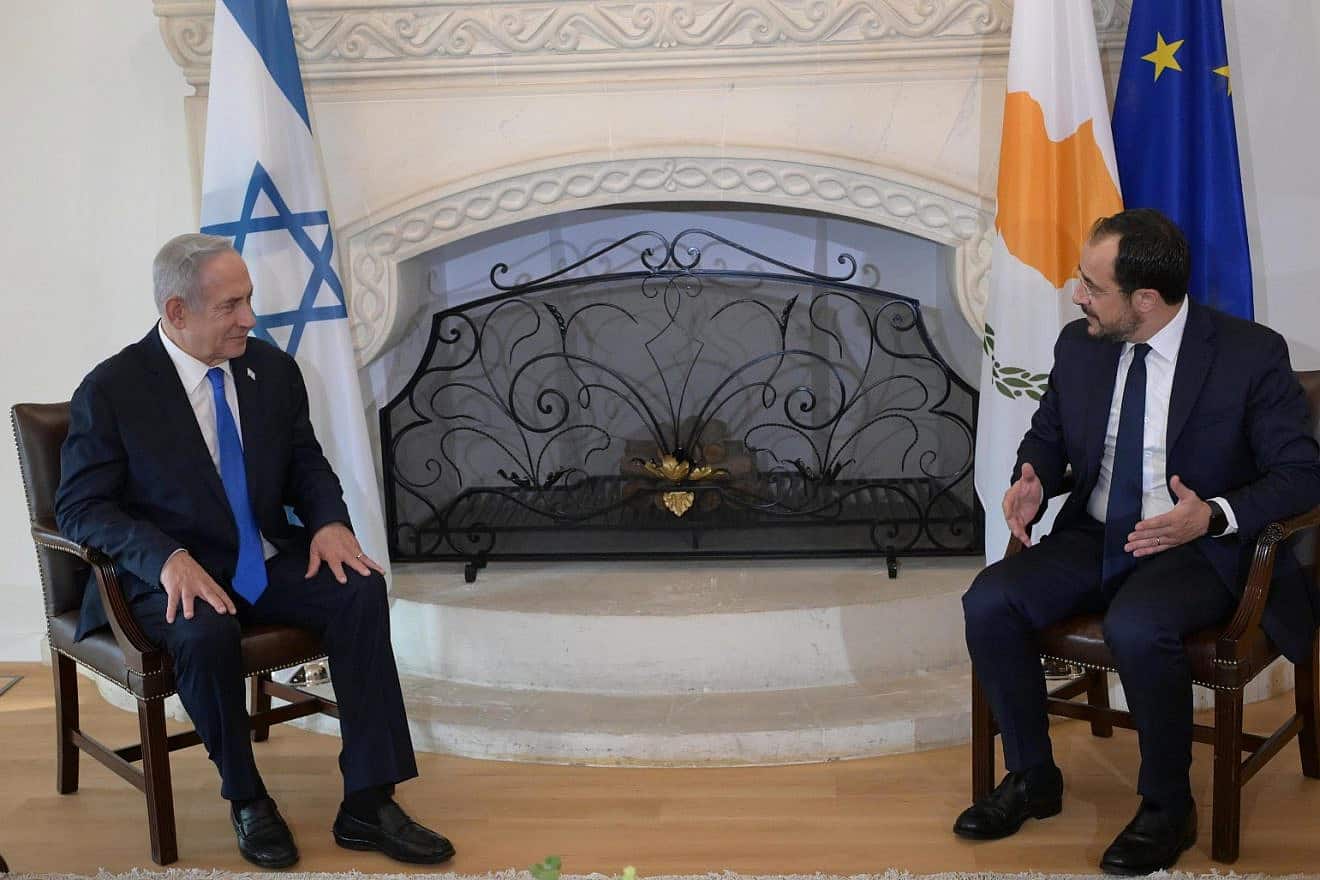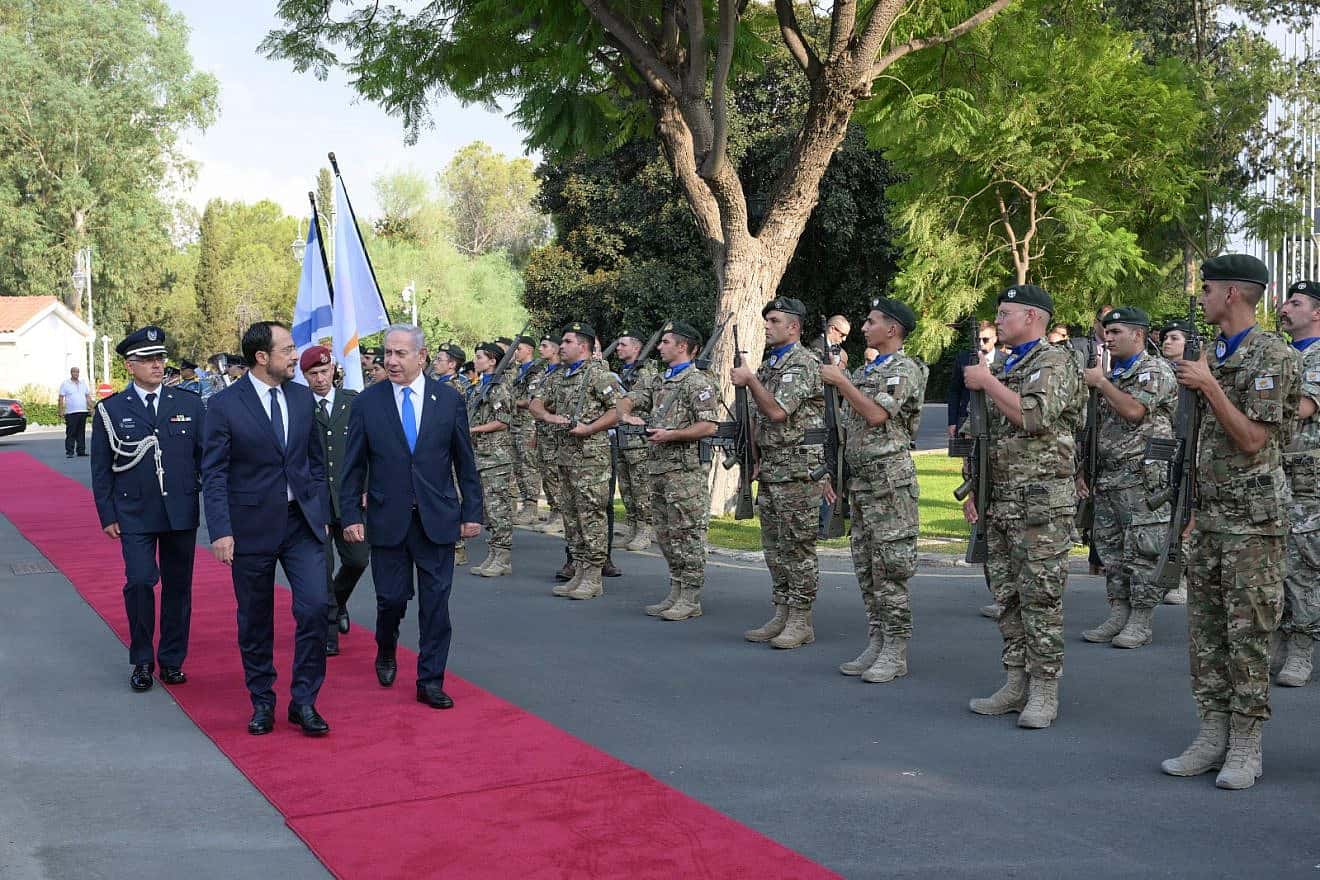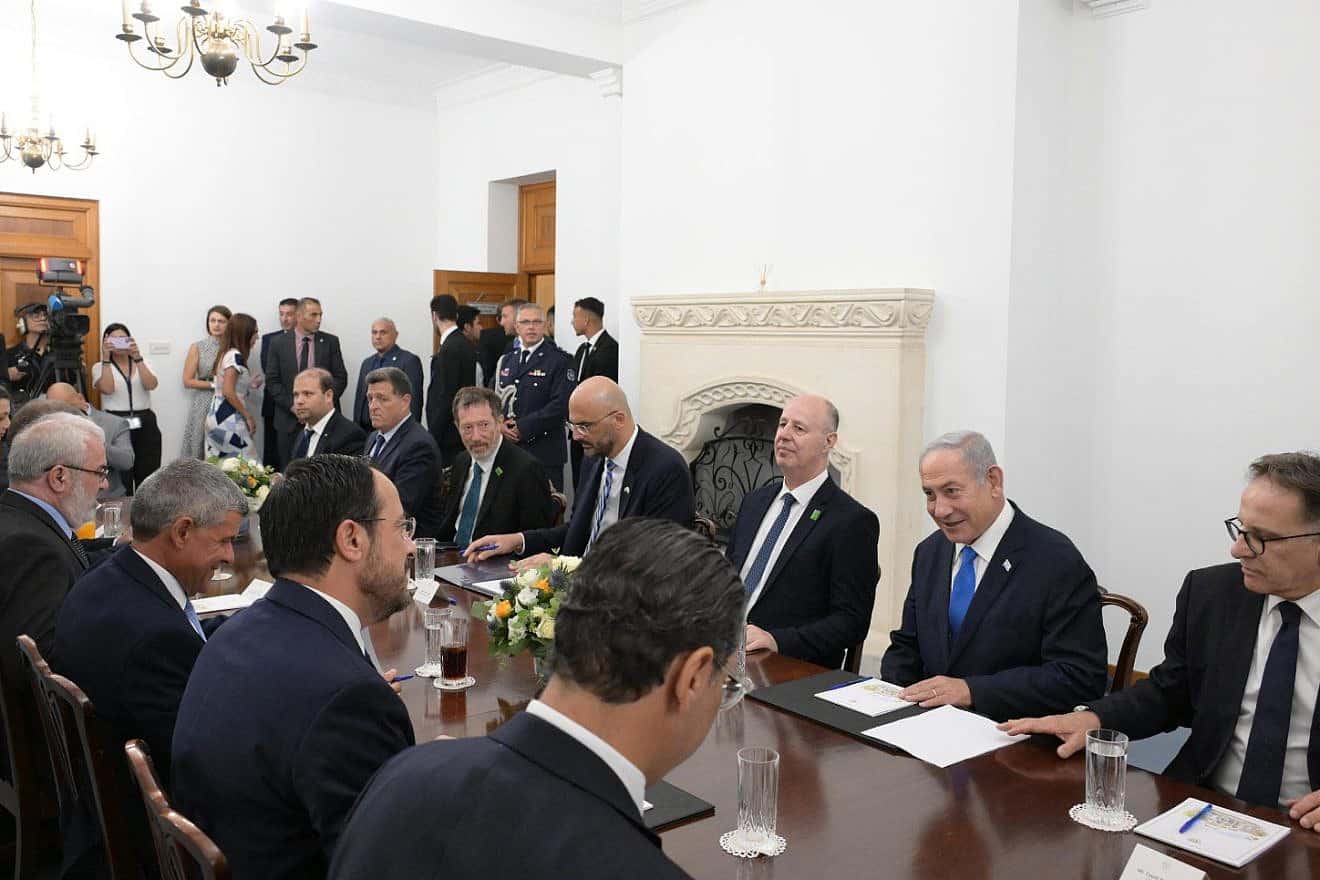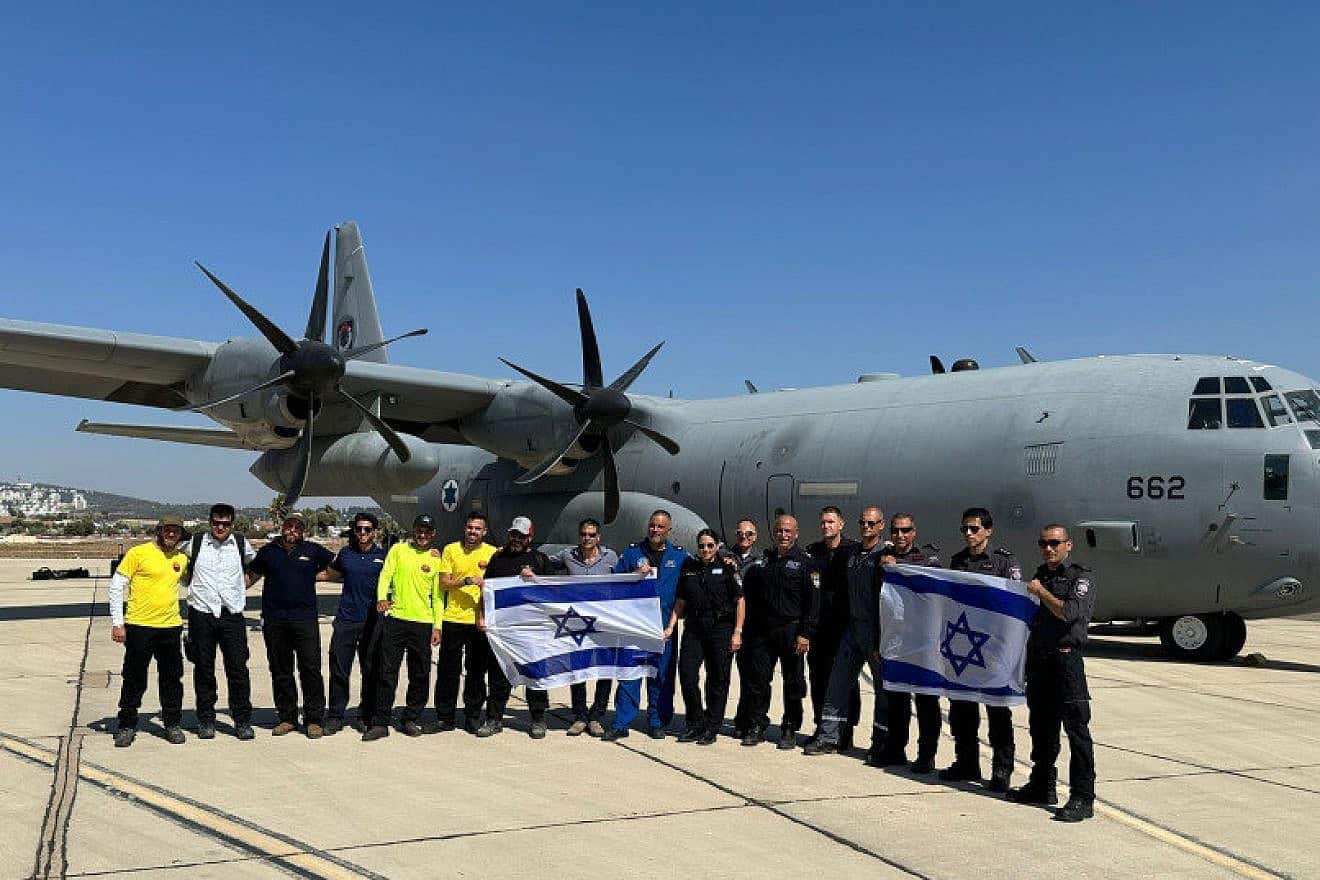 Israel to ink major energy deal with Cyprus and Greece
Israel to ink major energy deal with Cyprus and Greece
ETGAR LEFKOVITS
The plan involves linking the three countries’ power grids via the world’s longest and deepest underwater electricity cable.
.
 Israeli Prime Minister Benjamin Netanyahu meets with President of Cyprus Nikos Christodoulides in Nicosia, on Sept. 3, 2023. Credit: Courtesy.
Israeli Prime Minister Benjamin Netanyahu meets with President of Cyprus Nikos Christodoulides in Nicosia, on Sept. 3, 2023. Credit: Courtesy.
NICOSIA, Cyprus — Israel is poised to finalize an energy deal with Greece and Cyprus which will include a mammoth electricity project connecting the power grids of the three countries, and a potential future regional natural gas pipeline between the eastern Mediterranean allies.
The expected accord comes amid burgeoning relations between Israel and both Cyprus and Greece in a variety of fields including energy, defense, tourism, high-tech and cybersecurity.
The international energy venture puts the eastern Mediterranean on the map as a key energy provider to Europe, as the war in Ukraine and sanctions on Russia fuel a global energy crisis that has hit the European Union hard, spotlighting the continent’s dependence on foreign energy.
“The partnership between our three countries becomes stronger with each passing year,” Prime Minister Benjamin Netanyahu said on Sunday evening in Nicosia at the start of a 24-hour visit which will include a trilateral summit meeting of the three countries’ leaders on Monday.
 Israeli Prime Minister Benjamin Netanyahu and Cypriot President Nikos Christodoulides arrive at the Presidential Residence in Nicosia, Cyprus on Sunday, Sept. 3, 2023. Credit: Courtesy.
Israeli Prime Minister Benjamin Netanyahu and Cypriot President Nikos Christodoulides arrive at the Presidential Residence in Nicosia, Cyprus on Sunday, Sept. 3, 2023. Credit: Courtesy.
“Our strategic partnership and friendship is strong, and will solidify further,” said Cypriot President Nikos Christodoulides.
The top-level government meeting in Cyprus on Monday is expected to be the final round of consultations between the leaders before a deal is formally announced.
 The Israeli and Cypriot senior government teams meet in Nicosia, Cyprus, Sunday, Sept. 3, 2023. Credit: Courtesy.
The Israeli and Cypriot senior government teams meet in Nicosia, Cyprus, Sunday, Sept. 3, 2023. Credit: Courtesy.
Electricity and gas projects
The deal to link the three countries’ electrical grids, referred to as an “energy highway,” is expected to be inked first, Israeli National Security Adviser Tzachi Hanegbi told JNS.
The 2,000-megawatt undersea cable will be the world’s longest and deepest underwater electricity cable, crossing the Mediterranean seabed bridging Asia and Europe.
Netanyahu said that in the coming months a decision will also be made on how best to cooperate in the field of natural gas as part of a deepening partnership founded on the discovery of substantial offshore natural gas deposits which, he said, can serve as an energy corridor to Europe and beyond, including Arab countries in the region.
Among the options being considered are a natural gas pipeline between the three countries, known as the Eastern Mediterranean pipeline or simply EastMed; a liquefaction plant in Cyprus; a floating liquefaction plant in Israeli waters, or, pending the geostrategic situation with Ankara, a natural gas pipeline to Turkey which could pass through Cyprus as well and which will be connected to Azerbaijani gas.
Turkey has long been a regional rival to Greece, while Israel’s relations with Ankara, which have improved of late, have been unsteady in the face of the volatile and intermittently hostile leadership of Turkish President Recep Tayyip Erdogan.
Feasibility studies on the proposed 1,900 kilometer (1,300 mile), $6 billion EastMed pipeline are still ongoing, amid doubts regarding its financial feasibility.
“There is politics and there is economics,” University of Nicosia professor Andreas Theophanous told JNS. “The EastMed is not viable for economic reasons but we must start from somewhere, and [also] see if Turkey will change its policies towards Cyprus and Israel.”
Summit delayed
The trilateral summit in Cyprus, which was originally scheduled to be held last month, was postponed until this week due to Netanyahu’s hospitalization for the implantation of a cardiac pacemaker. Cyprus and Israel will also hold a full government to government (G2G) minister’s meeting in Israel in the first quarter of next year, the leaders announced Sunday.
Turkey too?
In a sign of warming ties between Jerusalem and Ankara, the Israeli leader is also set to visit Turkey shortly, the first such visit in over a decade and a half.
In a further sign of a regional push to include Turkey in a future gas deal, Israeli Energy Minister Israel Katz said on Sunday that he held separate talks with his Turkish and Egyptian counterparts, as well as with the U.S. envoy for regional normalizations efforts, following talks with the Greek and Cypriot energy ministers.
Regional firefighting force promoted
Netanyahu said that Israel was also supportive of a European decision to build a regional firefighting force and emergency center based in Cyprus, and suggested that the three countries also jointly consider purchasing a supertanker fire plane.
 The Israeli firefighting team being sent to Cyprus, Aug. 7, 2023. Credit: Prime Minister’s Office.
The Israeli firefighting team being sent to Cyprus, Aug. 7, 2023. Credit: Prime Minister’s Office.
Israel assisted both Cyprus and Greece combat major wildfires this summer, and received warm words of praise and thanks from the Cypriot president for its sign of friendship.
“The climate isn’t going to get cooler, it’s only going to get hotter,” said Netanyahu.
Joint history
The Israeli premier went on to state that the countries’ newfound friendship over the past decade after years of cold relations, which he called an anomaly, was based on common values and a shared history. “Western civilization is a result of basically Greek culture and Judaism fused together,” he said.
Zawartość publikowanych artykułów i materiałów nie reprezentuje poglądów ani opinii Reunion’68,
ani też webmastera Blogu Reunion’68, chyba ze jest to wyraźnie zaznaczone.
Twoje uwagi, linki, własne artykuły lub wiadomości prześlij na adres:
webmaster@reunion68.com
